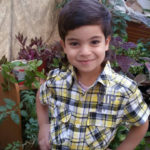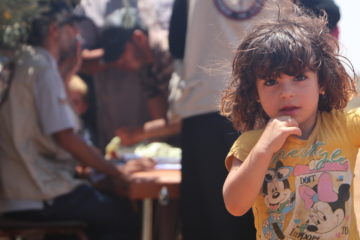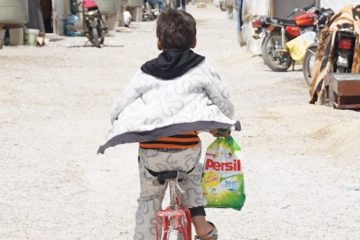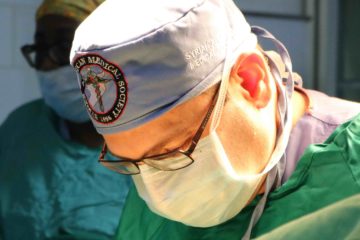April 18, 2016

Our driver is driving as fast as he can. I could tell that “K” is withering between each breath he inhales. He is getting tired. His head is drooping. His eyes are starting to show “shut down.” Dr. Naveed Iqbal says if we have to we will stop to do CPR on “K.” He was watching him constantly and calmly. I could tell the mother is overwhelmed. I kept dialoguing with “K” to keep him focused.
As I notice him begin to shut out, I tell “K” look at my eyes love. I try to get him to focus on my eyes and me focus on him. I ask him what color does he think my eyes are. I start telling him different colors and engage him. Dr.
Naveed Iqbal asked “K” to inhale from the inhaler. He shared with me what a strong boy “K” was and how he was inhaling just right. He wasn’t panicking and was fully cooperative. Dr.
Naveed Iqbal asks me to ask the mother if he has asthma and how often does he get the attacks. She said “K” gets asthma attack twice a year. I asked if the doctors have ever given her inhalers for his asthma. She says no. I am thinking how is this possible? How come no one has ever told her that her son needs inhalers, especially when he gets these attacks? I am baffled.
We arrive at the hospital and we look for the Emergency entrance. Dr.
Naveed Iqbal carries “K” in and places him on a patient bed. As I enter, I explain to the attending personnel that we are on a medical mission from the U.S. volunteering at a local clinic. We had an emergency situation where this boy needs help immediately. I get a nod from the gentleman I was talking to and then he returns to his paper work. I get agitated and say “This is a matter of life and death. Please drop your pen and help us.” He drops his pen in a sarcastic way and comes to see our “K.” I could tell Dr. Naveed Iqbal is frustrated because no one is working with him to stabilize “K.” I continue to soothe “K” and translate. There was a nurse who caught on quickly of the dire situation “K” was in and made a decision to work with Dr. Naveed Iqbal. The main emergency attending physician comes in and Dr.
Naveed Iqbal explains to him the situation. In that moment, this physician’s eyes swell up with tears and his facial expression says “This is serious. We need to get this child into ICU.” He goes outside to make some phone calls. I follow him to see if they are able to get him a bed. He replies to me that we need official paperwork. I start to rummage through my backpack for our official note stating we are on a mission with SAMS. I couldn’t find my papers. I ask Dr. Naveed Iqbal if he has a copy of the paper. Unfortunately he does not have any documents either. I got back out and start to pressure the physician stating that this is an urgent matter. We need to stabilize “K’s” vitals as soon as possible. Then I look at him in the eyes and say “Money is not an issue.” Really not knowing how we will pay but trusting somehow we will have the money for “K.”
I go back to comfort “K” where the attending gentleman who I asked to drop the pen starts to withdraw blood from “K’s” arm. We ask why is he doing that right now? He responds, “It’s our procedure before entering the ICU.” I get frustrated and share that he is adding distress to “K” and creating more risk for him. “K” is now crying loudly, distressed, stating his arm is hurting him from the needle. This attending then goes to “K’s” other arm. I assert myself again by stating “Please leave his other arm right now. You are distressing him.” The nurse tells him to listen and he walks away. We are also trying to get “K” to drink a mixture of water with diluted meds. He is not liking the taste. I remember my experiences with my daughter Sereen when she did not want to drink the iodine for CT Scans. Remembering one of our tricks, I ask the nurse to get me a straw. “K” uses the straw and slurps the water/medicine mixture.
We are finally assured that we could take “K” to the ICU. We push him on the hospital bed up to ICU. We again start to advocate for him. The ICU had better personnel who was calm and working with us to stabilize “K”. K’s mother is shut out and does not know what to do. “K” is still upset from his arm being poked with needles. I again stare into his eyes and start to tell him how I want him to learn to be calm. I teach him the strategy of counting to ten and then reflecting if he’s calm. We play the game a couple of times and he’s beginning to calm down. We get him to stabilize.
Dr. Naveed Iqbal makes sure “K” is in good hands. I translate to the ICU attending that this family cannot afford to pay and that they are refugees. SAMS would carry the cost of caring for this child. I get the mother’s number to communicate with her and make sure “K’s” doing well. Her husband and her thank me and Dr. Naveed Iqbal for our work with “K.”
As we are heading out, we decide to shake hands and thank the emergency folks that helped us. We returned to the clinic to join the rest of our team. The rest of the team was wrapping it up and I was very thankful for that. We updated the team on “K” and headed back to the hotel. We updated Dr. Jihad Shoshara, our team leader, on the situation with “K.” In the middle of the conversation I excused myself stating I was tired and needed to recuperate.
Upon my return, I have not been able to shut out “K’s” face out of my mind. I found the mother’s name and number. I contacted her a few days ago. She was not able to pick up the call but she started to text. I asked her about “K” and she said he was discharged and doing well. She said, “May God increase more people like you.” I felt so humbled. I asked her to send me pictures of “K” and I shared pictures of Sereen with her.
We really could have lost him. Dr. Naveed Iqbal and our team saved “K.” Yes, this was the most challenging day but yet the most rewarding. Never thought saving a life could be so impactful.
 Our driver is driving as fast as he can. I could tell that “K” is withering between each breath he inhales. He is getting tired. His head is drooping. His eyes are starting to show “shut down.” Dr. Naveed Iqbal says if we have to we will stop to do CPR on “K.” He was watching him constantly and calmly. I could tell the mother is overwhelmed. I kept dialoguing with “K” to keep him focused.
Our driver is driving as fast as he can. I could tell that “K” is withering between each breath he inhales. He is getting tired. His head is drooping. His eyes are starting to show “shut down.” Dr. Naveed Iqbal says if we have to we will stop to do CPR on “K.” He was watching him constantly and calmly. I could tell the mother is overwhelmed. I kept dialoguing with “K” to keep him focused.



